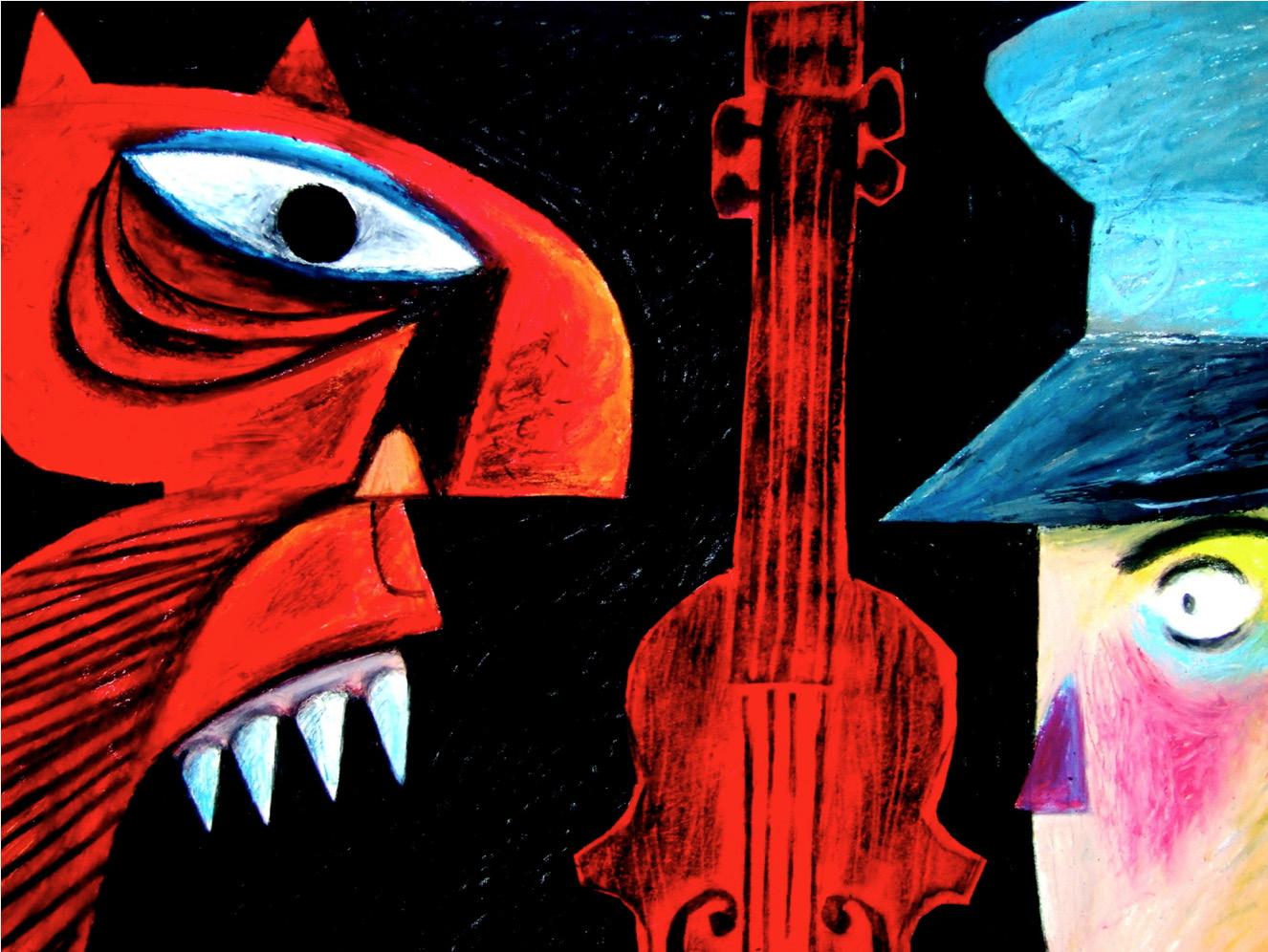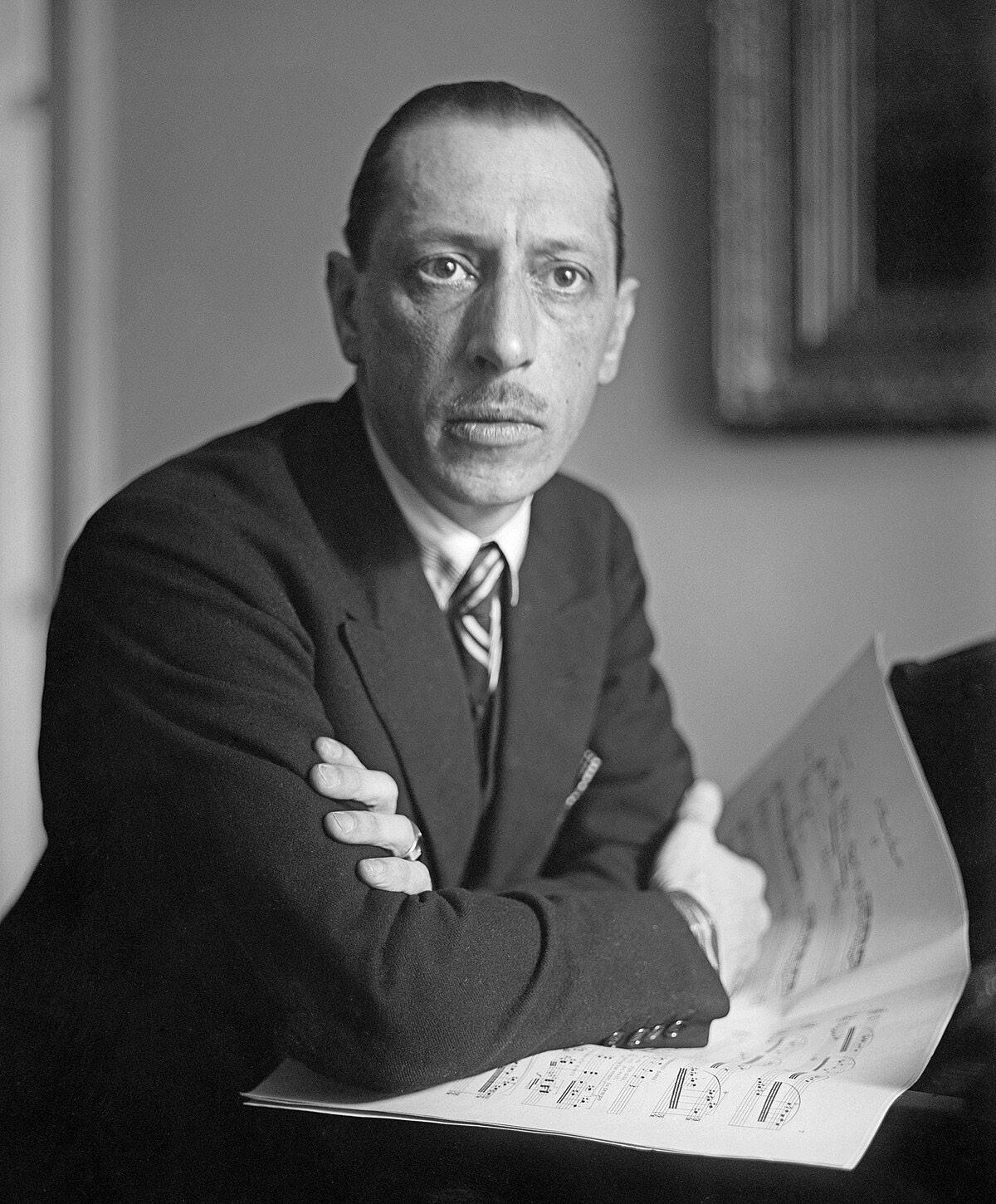
TUESDAY, FEBRUARY 27TH, 2024, 7PM
WEDNESDAY, FEBRUARY 28TH, 2024, 7PM
THE DEPOT THEATRE
DIRK MEYER, DSSO CONDUCTOR
CHANI NINNEMAN, WISE FOOL THEATER DIRECTOR



IGOR STRAVINSKY
L’Histoire du soldat (The Soldier’s Tale)
as an old man carrying a butterfly net. Joseph does not notice him but continues to play. The Devil sneaks up from behind and startles him.
The Devil asks Joseph to sell him his violin. When Joseph refuses he offers him a book that he says will lead to untold wealth. Joseph does not understand the book, but the Devil convinces him it is worth more than his cheap violin. Joseph realizes the book contains events that happen in the future. He accepts the Devil’s offer to spend three days at the Devil’s home in great luxury to learn about the book and teach the Devil the violin. After that time the Devil takes Joseph the rest of his way home.
BORN: June 17, 1882, in Oranienbaum (now Lomonosov), Saint Petersburg, Russia
DIED: April 6, 1971, in New York City
WORK COMPOSED: 1918
WORLD PREMIERE: September 28, 1918, in Lausanne, Switzerland; Ernest Ansermet conducting
INSTRUMENTATION: Clarinet, bassoon, cornet, trombone, percussion (bass drum, suspended cymbal, tambourine, triangle, field drum, two snare drums), violin, double bass, narrator, soldier, devil and female dancer.
DURATION: 65 minutes.
PART 1
Joseph Duprat, the Soldier, is walking exhausted toward his hometown on a 15-day leave, pack in tow. He rests by a stream. From his pack he takes out his lucky St. Joseph medallion, then a mirror, next a picture of his fiancée, and finally his violin. He begins to play. The Devil appears, disguised
But once in his hometown Joseph notices something strange: everyone runs away as they see him. He arrives at his fiancée’s house only to find her with husband and children. Finally he realizes that three years, not three days, have passed and that his former neighbors and friends think he’s a ghost.
Joseph sees the Devil in disguise as a cattle merchant and confronts him. The Devil tries to calm Joseph by reminding him of the book’s power: Joseph started off as a peddler but, with the knowledge gained from the book, quickly amassed wealth. The Soldier realizes this material wealth means nothing. All he wants is what he had before, the things everyone else has. Agitated, he leafs through the book for a solution, in vain.
The Devil arrives, now disguised as an old woman peddler. She offers for sale a lucky medallion, a mirror, a picture of a woman, and then a violin. Joseph moves to buy the violin, but when she hands it over he finds he can no longer play: it makes no sound. He hurls it away and tears up the book.
Joseph leaves his home with nothing and marches through town. He arrives at an inn where he hears the news that the king’s daughter is sick, and whoever can raise her from her bed will be given her hand in marriage. He makes his way to the palace.
The Devil is already at the palace disguised as a virtuoso violinist. Joseph turns over some cards and gets an air of confidence when they are all hearts. The Devil makes his presence known, clutching the violin to his chest, and taunts Joseph. The Narrator informs Joseph that the Devil still controls him because he retains the Devil’s money, and if he can lose all of it to the Devil in a card game he will be free.
This the Soldier does. He then takes the violin and plays. He triumphantly marches into the Princess’s chambers where he plays another tune. Miraculously the music revives her, and she begins a sequence of dances.
As the two embrace the Devil arrives, for the first time undisguised. Joseph shields the Princess. He realizes he can defeat the Devil by playing his violin. Unable to resist the music, the Devil begins to contort, is exhausted, and finally falls to the ground. Joseph takes the Princess’s hand and together they drag the Devil away before falling into each other’s arms.
But the Devil pops his head in and begins to torment the couple, warning Joseph that he will come to collect his soul if he ever leaves the castle’s premises.
CONCLUSION
The Narrator states the moral:
You must not seek to add
To what you have, what you once had; You have no right to share
What you are with what you were. No one can have it all:
That is forbidden;
You must learn to choose between. One happy thing is every happy thing; Two, is as if they had never been.
Many years later, the princess persuades her husband to secretly return to his village and bring his mother back to the castle. As he approaches the border of the town, the devil, dressed in crimson red, awaits with the soldier’s violin in his hand to take him down to hell. Joseph turns back to find his Princess, now gone. The work ends with violin and percussion entwined in a rhythmic duel with the final measures played solely by the percussionist - a nightmarish close to one of the greatest musical masterpieces of the twentieth century. L’Histoire du soldat reminds us that, in the end, we cannot have it all.
WE GIVE MANY THANKS TO OUR MUSICIANS, ACTORS AND BEYOND FOR THEIR DEDICATION AND HARD WORK.
ERIN ALDRIDGE, VIOLIN
JENNIFER GERTH, CLARINET
CHARLES LEIBFRIED, TRUMPET
COLIN O’DAY, PERCUSSION
VINCENT OSBORN, BASS
MICHAEL ROEMHILDT, BASSOON
LARRY ZIMMERMAN, TROMBONE
SUZIE BAER, DANCER
BRADLEY DAMON, SOLDIER
KRIS KINCAID, DEVIL
JEFFREY MADISON, NARRATOR
JEFF BROWN, LIGHTING DESIGNER
ANN GUMPPER, SCENIC DESIGN
CAL METTS, SET CONSTRUCTION
